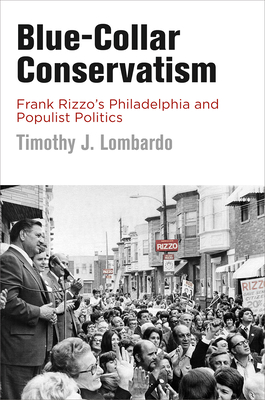Blue-Collar Conservatism: Frank Rizzo's Philadelphia and Populist Politics

Blue-Collar Conservatism: Frank Rizzo's Philadelphia and Populist Politics
The postwar United States has experienced many forms of populist politics, none more consequential than that of the blue-collar white ethnics who brought figures like Ronald Reagan and Donald Trump to the White House. Blue-Collar Conservatism traces the rise of this little-understood, easily caricatured variant of populism by presenting a nuanced portrait of the supporters of Philadelphia Mayor Frank Rizzo.
In 1971, Frank Rizzo became the first former police commissioner elected mayor of a major American city. Despite serving as a Democrat, Rizzo cultivated his base of support by calling for law and order and opposing programs like public housing, school busing, affirmative action, and other policies his supporters deemed unearned advantages for nonwhites. Out of this engagement with the interwoven politics of law enforcement, school desegregation, equal employment, and urban housing, Timothy J. Lombardo argues, blue-collar populism arose.
Based on extensive archival research, and with an emphasis on interrelated changes to urban space and blue-collar culture, Blue-Collar Conservatism challenges the familiar backlash narrative, instead contextualizing blue-collar politics within postwar urban and economic crises. Historian and Philadelphia-native Lombardo demonstrates how blue-collar whites did not immediately abandon welfare liberalism but instead selectively rejected liberal policies based on culturally defined ideas of privilege, disadvantage, identity, and entitlement. While grounding his analysis in the postwar era's familiar racial fissures, Lombardo also emphasizes class identity as an indispensable driver of blue-collar political engagement. Blue-Collar Conservatism ultimately shows how this combination of factors created one of the least understood but most significant political developments in recent American history.
PRP: 270.86 Lei
Acesta este Prețul Recomandat de Producător. Prețul de vânzare al produsului este afișat mai jos.
216.69Lei
216.69Lei
270.86 LeiLivrare in 2-4 saptamani
Descrierea produsului
The postwar United States has experienced many forms of populist politics, none more consequential than that of the blue-collar white ethnics who brought figures like Ronald Reagan and Donald Trump to the White House. Blue-Collar Conservatism traces the rise of this little-understood, easily caricatured variant of populism by presenting a nuanced portrait of the supporters of Philadelphia Mayor Frank Rizzo.
In 1971, Frank Rizzo became the first former police commissioner elected mayor of a major American city. Despite serving as a Democrat, Rizzo cultivated his base of support by calling for law and order and opposing programs like public housing, school busing, affirmative action, and other policies his supporters deemed unearned advantages for nonwhites. Out of this engagement with the interwoven politics of law enforcement, school desegregation, equal employment, and urban housing, Timothy J. Lombardo argues, blue-collar populism arose.
Based on extensive archival research, and with an emphasis on interrelated changes to urban space and blue-collar culture, Blue-Collar Conservatism challenges the familiar backlash narrative, instead contextualizing blue-collar politics within postwar urban and economic crises. Historian and Philadelphia-native Lombardo demonstrates how blue-collar whites did not immediately abandon welfare liberalism but instead selectively rejected liberal policies based on culturally defined ideas of privilege, disadvantage, identity, and entitlement. While grounding his analysis in the postwar era's familiar racial fissures, Lombardo also emphasizes class identity as an indispensable driver of blue-collar political engagement. Blue-Collar Conservatism ultimately shows how this combination of factors created one of the least understood but most significant political developments in recent American history.
Detaliile produsului









